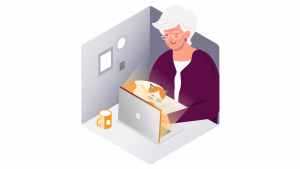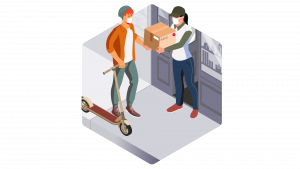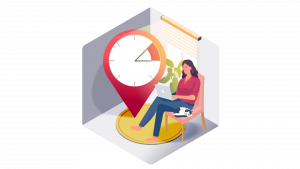15 million new European e-shoppers in 2020
Due to the pandemic, we did not conduct a survey of e-shoppers in 2020. Therefore, the 2020 E-Shopper Barometer is based on data from previous DPDgroup E-Shopper Barometer studies / third-party sources and does not include local figures.
The industry adapted very quickly to be able to continue to operate while ensuring the safety of employees and consumers. In the past year 2020, especially during the Corona pandemic, there has been an incredible growth of e-commerce. The growth of e-commerce was triggered by a higher frequency of purchases by e-shoppers who had already started buying before the pandemic, but also by the entry of about 15 million new e-shoppers into the EU e-commerce space:
- +26.7% increase in e-commerce sales in the EU (12% in 2019).
- The fastest growth comes from Spain (+36%), then the UK (+34.7%), then CEE (+29.1%)
This also brings an increase in the importance of this channel:
12% share of e-commerce in EU retail sales in 2020 vs. 9% in 2019 vs. 8.5% in 2018.
Now we know the e-commerce numbers, but how has that played out in terms of business?

A clear shift in the online shopping cart
- +95% Food & Fresh Transactions
- +61% High-tech transactions
- -5% fashion transactions in the same period
Food in Europe in 1st place - these used to be more of a niche product. Since 2020, food has overtaken the fashion and footwear category!
Diverse e-shoppers drive e-commerce
By 2019, the e-commerce sector was highly concentrated: 45% of regular e-shoppers were responsible for 85% of online purchases.
This reality changed in 2020 - occasional e-shoppers became regular shoppers as their frequency of purchase increased. As new e-shoppers emerged, the senior e-shopper profile also grew in importance.
Older e-shoppers have more purchasing power, but also a more traditional way of shopping online. The role of social media in the buying experience is limited: For example, only 10% rely on social media advertising during the decision-making process.
Strong purchase drivers use price comparison tools, read detailed product descriptions and do not expect as many choices in terms of delivery (speed and locations). They mostly use home delivery (92%).


Sustainability - a growing expectation
In 2020, this demand for sustainability has grown strongly and become a need across the entire value chain. As recently as 2019, 70% of regular e-shoppers in the EU believed that brands and companies need to be environmentally conscious.
Also trending strongly are so-called "clean" deliveries:
E-shoppers are also paying much more attention to reducing their environmental impact with 43% of UK e-shoppers saying they would be likely to switch to another e-provider that offers a wider range of sustainable delivery options.
Combined orders are also an important factor:
In France, 71% of e-shoppers tried to combine online orders to limit the number of deliveries.
And alternative delivery locations also continue to make inroads:
In the UK, 40% of e-shoppers would be more likely to choose a delivery alternative if a retailer provided information on emissions for each available option.
Sustainability must be an active and permanent goal for all e-commerce providers, as more and more e-shoppers are looking for and demanding environmentally friendly products and services!
E-shoppers are open to new things
We know from previous editions of the Barometer that e-shoppers are very loyal and not very inclined to try new websites - if the experience is positive.
However, 2020 was the year of digitalisation: Omnichannel was important before, but in 2020 it was crucial.
The number of e-commerce websites increased significantly as Omnichannel became the new normal. We remember that online was the only sales channel possible during the lockdowns:
- 39% of e-shoppers discovered one or more online shops at the height of the pandemic
- 29% of consumers discovered small retailers they didn't know about beforehand
Nearly 9 in 10 people (85%) worldwide intend to spend money in the future at an online retailer previously unknown to them. Businesses of all sizes have the opportunity to build relationships with many consumers who have shown they are open to giving unknown brands a chance.


Predictability - an expectation regarding delivery
The growth of e-commerce has led to some shifts in profiles, an upgrade as it were: casual shoppers are becoming regular shoppers, regular shoppers are becoming aficionados.
Driven by context and the upgrading of e-shopper profiles, expectations around delivery are also shifting towards those that aficionado e-shoppers were already displaying in 2019:
With the growing number of parcels received, predictability of delivery is crucial (at least knowing the time window of delivery, if not choosing it). Next-day delivery was already a requirement in Western EU markets in 2019 and is moving in that direction in Eastern markets as well. This has thus become an important expectation in the context of important goods purchased online.
We help you to adapt to this new normality:
-
By being, dear customer, the reference provider for green deliveries
-
By being where your customers are
-
By maximising the interaction with your customers
We will continue to listen to the voice of e-shoppers (a new edition of the E-Shopper Barometer is planned for this year) and look forward to presenting the new findings to you next year!



